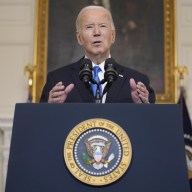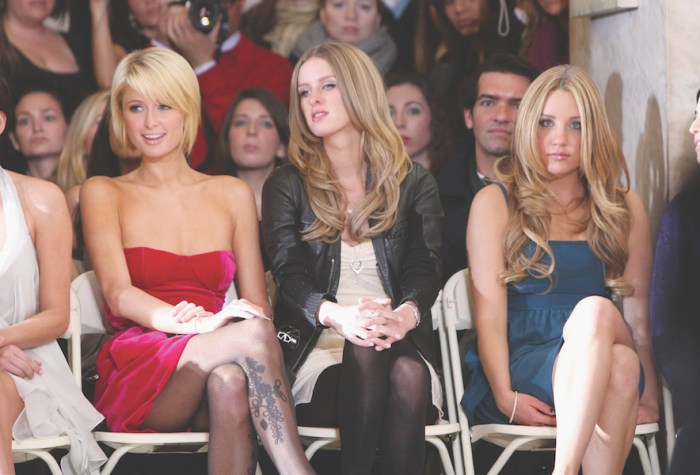You may not know the name Thinkmodo, but you’ve likely seen its work. Remember the viral YouTube video of a demon baby scaring the bejesus out of New Yorkers? Or maybe you caught the one about a“Carrie”-like girl with telekinetic powers who sent a man flying at a West Village coffee shop.
Michael Krivicka and James Percelay run viral marketing agency Thinkmodo, with the help of associate producer Sam Pezzullo. At their small, spartan office in midtown Manhattan, the skeleton crew churns out some of the greatest pranks – and ads – in New York City and on the Internet.
“We wear a zillion hats,” said Percelay. “We do it all – it takes just three guys to beat brands like Pepsi and Nike.”
It all started with “Nude It,” a fake app that purported to make people look naked when you held your phone in front of them. Krivicka was spending his days at an unsatisfying video editing job when he created a YouTube video featuring the app, which quickly went viral. The video caught the eye of Percelay, a former “Saturday Night Live” producer, who was developing a digital unit for a food company and itching to try something new. He reached out to Krivicka and the rest is history.
Thinkmodo’s inaugural project was a pilot for an online reality series about marriage proposals for WE TV in 2009, and Krivicka used the opportunity not just to show off his creative skills but also to actually propose to his wife. He “stopped time” by having actors at a restaurant freeze in position when he snapped his fingers and asked his now-wife to marry him.
They got their big break when they were hired to promote the movie “Limitless” in 2011. They created a video in which a man hacks the screens in Times Square with just his iPhone and a “video transmitter.” His secret? A fictional pill called NZT – the same one Bradley Cooper’s character takes in the film. Thinkmodo’s secret? They rented the screens in Times Square so they could sync up the video on the screens with the one on the iPhone.
Since then, Thinkmodo’s budgets for these ads have multiplied from “just a few thousand dollars to starting at $500,000 and over $1 million,” according to Percelay. They’ve sent teenagers flying in the skies of New York for “Chronicle” and built underwater nightclubs for watch brand TechnoMarine – all without the aid of CGI.
“It’s our aesthetic,” said Percelay. “People know if something is real.”
That means those teenagers were really human-shaped radio-controlled airplanes, and the underwater nightclub had to be built from scratch in a Navy dive tank, complete with underwater speakers. Scuba divers replaced actors in the video, wearing custom helmets and carrying dart guns for an underwater bar game.
It takes a lot of time – four to 12 weeks – and manpower to bring Krivicka and Percelay’s outlandish ideas to life. They typically start with a simple napkin drawing of their idea to their clients and then search the country looking for the best talent to make their dream a reality, enlisting everyone from animatronics designers to hovercraft makers.
The level of painstaking detail that goes into Thinkmodo’s work mean the agency can only take on five or six projects a year. They said they turn down offers from brands on a weekly basis. “We have to tell them sometimes that we don’t have that killer idea,” said Krivicka. He said they only accept one or two out of every 10 invitations to create a campaign.
“We don’t just want to hit just a double – we want to hit a home run every time,” explained Percelay. “It’s like making five handmade supercars a year instead of mass-producing sedans. We’re the Bugatti of ad agencies.”
Percelay said the company’s hits put not just their clients but also their partners on the map. A hovercraft manufacturer that created a golf cart hovercraft for an Oakley ad with Bubba Watson now sells the same product – it can be yours for $58,000.
“Everybody we work with becomes famous,” said Percelay. “This small hovercraft company in Indiana can’t keep up with demands now.”
For clients, the viral videos create buzz and media coverage without the need to buy additional ads. “We don’t ever buy views,” said Krivicka. “We’re transparent – just like our office.” He gestured toward the glass walls of the space.
That transparency involves playing by the rules when they pull off stunts around New York. They always get permits to film and have participants sign waivers; for example, the coffee shop patrons featured in the “Carrie” stunt knew they were being filmed, they just didn’t know what would happen. They also bring a NYPD officer with them to avoid erring on the wrong side of the law: The MTA is investigating rival firm Relevant for its recent subway prank promoting “The Walking Dead.”
Krivicka and Percelay said it’s been a wild journey. Krivicka said sometimes he doesn’t even know how they’ll execute their ideas – “We pitch it and then we’re like, ‘Uh, what are we going to do now?'” – but somehow, they always deliver.
Percelay said of their journey, “It’s surreal. It’s like playtime and you get to make real toys that are $50,000 to $100,000.”
Follow Andrea Park on Twitter: @andreapark


















